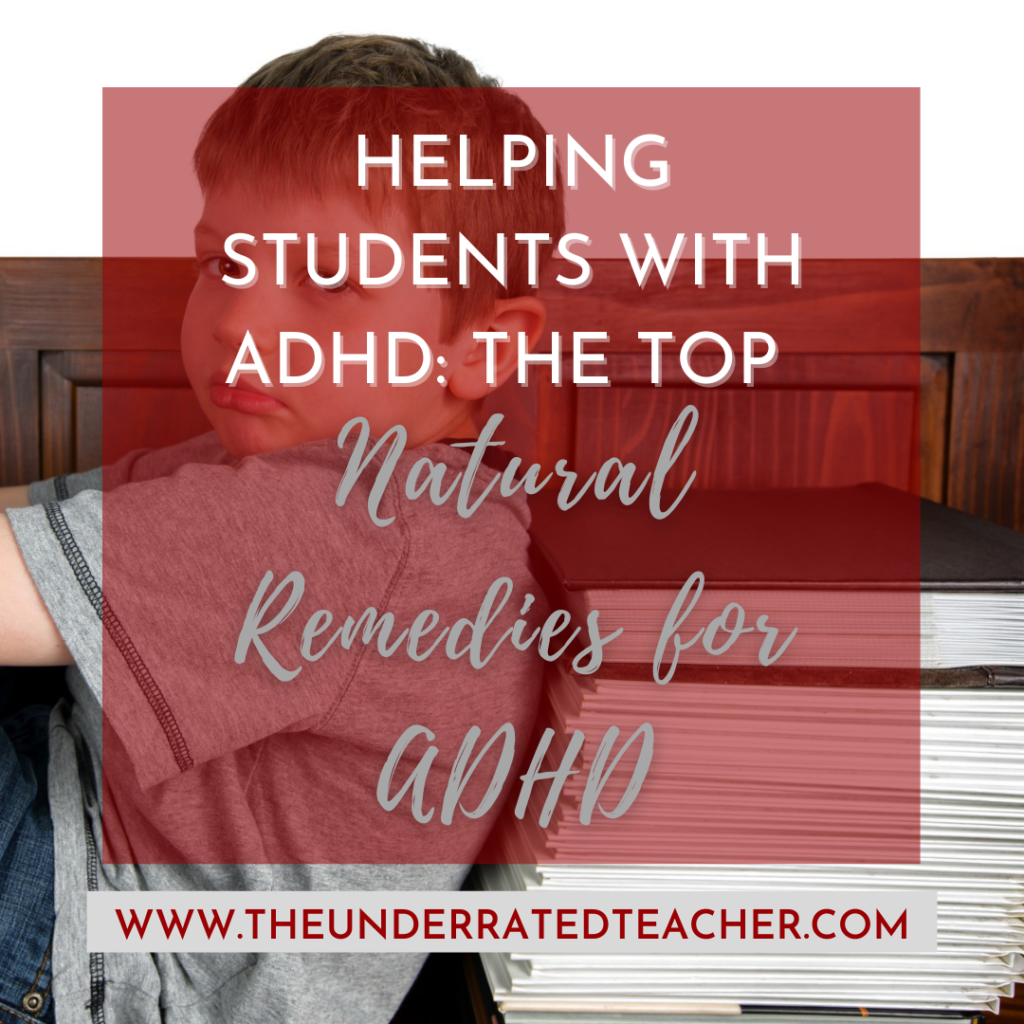 The Top Natural Remedies for ADHD for Your Students
The Top Natural Remedies for ADHD for Your Students
Did you know that ADHD affects an estimated 9 percent of American children between the ages of 13 and 18?
ADHD, short for attention deficit hyperactivity disorder, is a neurological and behavior-related condition. It can cause impulsiveness, excessive energy, and difficulty in concentration.
While ADHD is common in young children and teens, some individuals carry on this disorder into adulthood.
While ADHD is traditionally treated with drugs prescribed by medical professionals, there are natural remedies for ADHD that can be used in addition to prescribed drugs or as a replacement.
Why opt for natural medication? Well, while many drugs prescribed for ADHD improve symptoms by enhancing and balancing neurotransmitters, they can also provide some nasty side effects. These side effects can further negatively affect a child or teen suffering from ADHD.
Such side effects include various sleep problems, mood swings, loss of appetite, heart problems, or even suicidal thoughts or actions.
If you’re not comfortable treating your child with drugs, natural remedies may be an option.
Ready to discover these remedies? Read on to learn more.
And remember that even natural treatments for ADHD should always be discussed with a health professional before use.
1. Avoid Food Colorings and Preservatives
Certain food colorings and preservatives can increase hyperactive behavior in some children and teens.
Processed foods are packed full of colorings, dyes, and preservatives so all processed foods should be avoided if possible. Remember that food dye can appear in foods and drinks you wouldn’t necessarily think of. These include sports drinks, cake mixes, chewable vitamins, and even toothpaste!
MSG and HVP are two additives that decrease dopamine levels in children, teens, and adults. Dopamine associates with the brain’s pleasure and reward systems.
So, for individuals suffering from ADHD, balanced levels are essential. Keep an eye out and avoid any foods containing high levels of dopamine.
Artificial sweeteners too aren’t just bad for your health but can negatively affect those suffering from ADHD. This is because artificial sweeteners create biochemical changes.
This can, in turn, harm cognitive function and emotional balance in the body. So, step away from the sweeteners!
2. Dodge Potential Allergens
Restricting certain allergens in a diet may help improve the symptoms of ADHD in some children and teens.
The top food allergies and sensitivities in those suffering from ADHD include soy, wheat, dairy, peanuts, tree nuts, eggs, and shellfish. Other less common allergies include papaya, avocados, bananas, kiwis, coriander, or fennel.
If an individual with ADHD is allergic to such foods, these allergies can disrupt hormones and contribute to the disorder.
If you’re unsure if your child or teen has any allergies, it may be worth checking with an allergy doctor. Or otherwise, experiment with the process of elimination of the above foods and ingredients.
3. Change Diet Further
Further changing a diet and consuming certain foods is a great natural treatment for ADHD.
For example, foods high in B-vitamins help maintain a healthy nervous system. Vitamin B-6 is necessary for the body to produce and use essential brain chemicals like serotonin, dopamine, and norepinephrine. Try adding lots of green leafy vegetables, wild tuna, and bananas into the diet to gain essential vitamin Bs.
Wild salmon too is rich in vitamin B-6. What’s more, it’s also packed full of omega 3 fatty acids. These provide useful for kids suffering from learning and behavioral problems.
For many, skipping breakfast comes naturally. But for those experiencing ADHD, consuming breakfast in the morning is crucial. That’s because breakfast helps the body regulate blood sugar levels. It also helps stabilize hormone fluctuations first thing in the morning.
As well as avoiding sweeteners, food colorings, and preservatives, children and teenagers with ADHD should also avoid consuming lots of sugar.
This is a primary trigger of ADHD for a lot of children and even adults. Avoid giving your child any forms of concentrated sugar including candy, desserts, soda, or fruit juices.
Likewise, it’s best to avoid foods containing gluten too as some children or teenagers with ADHD are sensitive to the protein found in wheat.
Avoid all foods produced with wheat such as bread, pasta, and wheat cereal. Or, you can seek gluten-free or grain-free options. You’ll find that most supermarkets and local grocery stores stock up with such alternatives nowadays.
Caffeine too should be minimized or avoided as side effects of consumption can include anxiety and nervousness. These mental disorders are known to contribute to the symptoms of ADHD.
4. Spend Time Outside
For children and teens diagnosed with ADHD, spending time outside is crucial. This is because for some children, like ones that suffer from ADHD, learning is more effective by seeing or doing activities rather than by sitting still and listening in a classroom.
Even spending 20 minutes a day outside can benefit children with ADHD by improving their concentration and regular exposure to outdoors and green space is a safe treatment to help such children. A park or nature setting is a good option to clear the mind and get some fresh air.
Burning off excess energy is also a great way of balancing hormone levels for kids and teenagers with ADHD. Make sure to encourage them to engage in plenty of regular physical exercise or outdoor playtime if they are younger. These bursts of physical activity are key building blocks for healthy bones, muscles, and a clear mind.
5. Take Supplements
Taking certain natural vitamins is a key way to improve the symptoms of ADHD. And most are readily available natural remedies for ADHD.
Fish oil and omega 3 are brain vitamins and benefit ADHD patients as they improve brain function and are anti-inflammatory. Such supplements reduce ADHD symptoms and improve learning capacities.
B-Complex vitamins can also help children and teens with ADHD as they help with the production of serotonin – especially in vitamin B-6.
A multi-mineral supplement including the likes of zinc, magnesium, and calcium is another good shout for ADHD sufferers. All key vitamins play a crucial role in relaxing the nervous system.
Probiotics too can be helpful as ADHD links to digestive issues. So, taking a good quality probiotic daily will help maintain positive intestinal health.
Herbs such as ginkgo, ginseng, and passionflower may also help calm hyperactivity and can be consumed easily as teas.
Remember to first discuss with your doctor or a medical professional if you’re interested in trying these alternative treatments. This is to ensure they’ll work well with your child or teen. Supplementing without a medical professional’s oversight can be dangerous – especially with children.
6. Behavioral or Parental Therapy
For children and teens with more severe cases of ADHD, behavioral therapy can help. This approach works by resolving specific challenging behaviors and offers solutions to avoid them. This can involve setting goals for the child or teenager.
Parental therapy is similar, but as it sounds, the focus is helping provide parents with the tools, techniques, and strategies to assist their child with ADHD. This can also involve some lifestyle changes and creating a family environment whereby the child or teen feels supported with their disorder.
Children and teenagers experiencing ADHD need reassurance that they aren’t ‘bad’ kids. So, parents should always find ways to compliment and reward positive behaviors. If the only interaction they receive is a response to negative behaviors, this will only trigger more negativity within them.
Let your child know and understand that they are more than just their ADHD. A child or teenager knows when their parents are truly excited and happy for them, to provide them with opportunities where they can succeed.
For younger children, engage them in creative activities such as painting or drawing.
For older children, teaching them how to cook is a great way to help them learn more about their condition and how to manage it. Since ADHD is so heavily linked to foods consumed, your child must learn which ones to consume and which to avoid.
Engage them in the learning, preparation, menu planning, and cooking process to help them build creativity within the home.
Trying Natural Remedies for ADHD
These natural remedies for ADHD will hopefully improve the symptoms of ADHD for your child or teenager, but as mentioned it’s always important to first discuss any alternative treatments with a health professional who knows your child’s background.
Did you enjoy this article? Want to create some of your content? Do you have a business or an idea you are passionate about but you’re not too sure where to start?
Join my exclusive introductory webinar here and let me guide you towards achieving those dreams!


